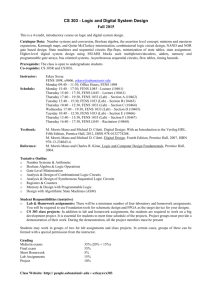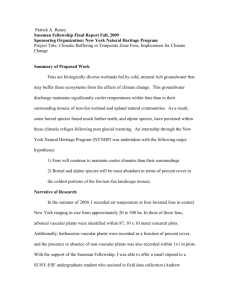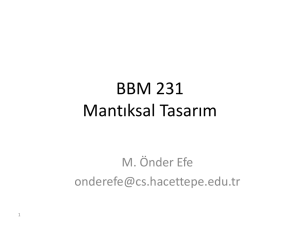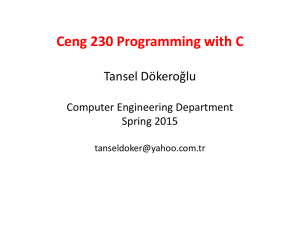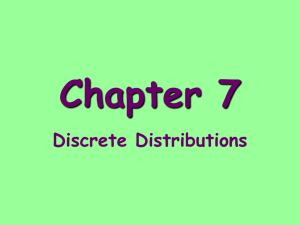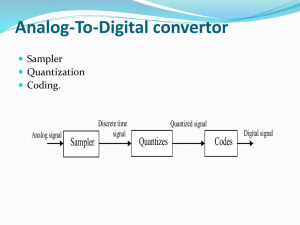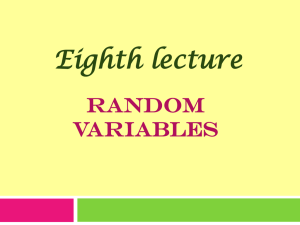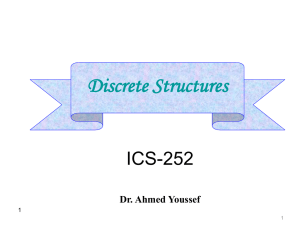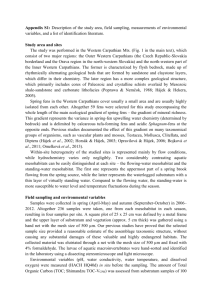Chapter 0 - Introduction
advertisement
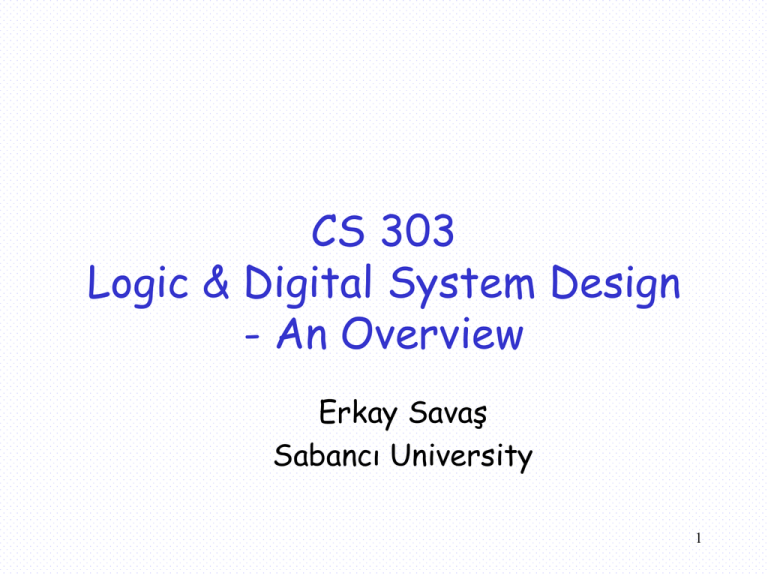
CS 303
Logic & Digital System Design
- An Overview
Erkay Savaş
Sabancı University
1
Motivation
• Analysis & design of digital electronic circuits
• Why digital circuits?
– They are everywhere and generic
– digital computers, smart phones, data communication,
digital recording, digital TV, many others
• Fundamental concepts in the design of digital
systems
• Basic tools for the design of digital circuits
• Logic gates (AND, OR, NOT)
– Boolean algebra
2
What is a Digital System?
• One characteristic:
– Ability of manipulating discrete elements of
information
• A set that has a finite number of elements
contains discrete information
• Examples for discrete sets
– Decimal digits {0, 1, …, 9}
– Alphabet {A, B, …, Y, Z}
– Binary digits {0, 1}
• One important problem
– how to represent the elements of discrete sets in
physical systems?
3
How to Represent?
• In electronics circuits, we have electrical signals
– voltage
– current
• Different strengths of a physical signal can be
used to represent elements of the discrete set.
• Which discrete set?
• Binary set is the easiest
– two elements {0, 1}
– Just two signal levels: 0 V and 4 V
• This is why we use binary system to represent
the information in digital systems.
4
Binary System
• Binary set {0, 1}
– Th elements of binary set, 0 and 1 are called “binary
digits”
– or shortly “bits”.
• How to represent the elements of other discrete
sets
– Decimal digits {0, 1, …, 9}
– Alphabet {A, B, …, Y, Z}
• Elements of any discrete sets can be represented
using groups of bits.
– 9?
– A?
5
How Many Bits?
• What is the formulae for number of bits to
represent a discrete set of n elements
• {0, 1, 2, 3}
– 00 0, 01 1, 10 2, ands 11 3.
• {0, 1, 2, 3, 4, 5, 6, 7}
– 000 0, 001 1, 010 2, ands 011 3
– 100 4, 101 5, 110 6, ands 111 7.
• The formulae, then,
– ?
– If n = 9, then ? bits are needed
6
Nature of Information
• Is information of discrete nature?
• Sometimes, but usually not.
– Anything related to money (e.g. financial computations,
accounting etc) involves discrete information
• In nature, information comes in a continuous form
– temperature, humidity level, air pressure, etc.
• Continuous data must be converted (i.e.
quantized) into discrete data
– lost of some of the information
– We need ADC (DAC)
7
General-Purpose Computers
• Best known example for digital systems
• Components
– CPU, I/O units, Memory unit
CPU
Memory
Registers
ALU
FPU
Inter
connect
I/O
Outside
world
Control
Multiplier/
Divider
CPU
General-purpose computer
8
Textbook & References
• Textbook
– M. Morris Mano, & Michael D. Ciletti “Digital Design”,
Fourth Edition, Prentice Hall, 2007.
• Other references
– M. Morris Mano and Charles R. Kime, “Logic and
Computer Design Fundamentals”, Fourth Edition
Prentice Hall, 2007.
– Tens of digital design books
9
Lecture
• Three hours (2+1) a week (four credits)
• Monday: 12:40 – 13:30 (FENS G077)
• Thursday: 15:40 – 16:30 (FENS G077)
• Attendance is a must
– Failing to attend three lectures in
which attendance is collected
may result in
one letter down in your grade
10
Recitation
• One hour (two sections)
• A: Thursday: 13:40 – 14:30 (FENS G077)
• B: Friday: 13:40 – 14:30 (FENS G029)
• What to do?
–
–
–
–
Regular lecture (if necessary)
Instructive sessions for lab equipments
Problem solving sessions (e.g. preparatory for exams)
HDL language sessions
• How to know?
– It will be announced
11
Laboratory Assignments
• Six Sections
–
–
–
–
–
•
•
•
•
A – Tuesday: 10:40 – 12:30 (FENS 1033)
B – Monday: 08:40 – 10:30 (FENS 1033)
C –Tuesday: 08:40 – 10:30 (FENS 1033)
D –Monday: 13:40 – 15:30 (FENS 1033)
E – Monday: 10:40 – 12:30 (FENS 1033)
At least four lab assignments
It is obligatory to do all the assignments
Weight: 15%
Work in groups of two
12
Your Board
13
Short Homework Assignments
• At times
• Weight: 5%
14
Project
• A big development project where you use what
you learn
– Design + implementation
•
•
•
•
Weight: 10%
No partial credit
Essential to demonstrate a working version
Works in groups of two
15
Exams
• Two midterm exams
– Weight: 35%
– Midtem I : November
– Midterm II : December
• Final exam
– Weight: 35%
– As scheduled by registration office
• Only one makeup exam
– After final exam that substitues exams you missed
16
Lab & Term Project
• 1st lab: integrated circuits on a breadboard
• Other labs: FPGA board
• How to use them:
• Informative sessions during recitation hours
17
Lab Assistants
•
•
•
•
•
Duygu Karaoğlan (FENS 2001)
Hazar A. İlhan
Ecem Ünal
Yusuf Külah
Others
18
SUCourse
• Will be used for (nearly) everything
–
–
–
–
–
communication media
announcements
lab assignments postings
short homework postings
uploading reports, homework, etc.
19
Contact Information
• Erkay Savaş
•
•
•
•
•
Place: FENS 1098
e-mail: erkays@sabanciuniv.edu
Use SUCourse, then e-mail
You can call me if it is urgent
Office hours:
– Monday 15:40 – 17:30
– Or by appointment
– TBA for assistants
20
